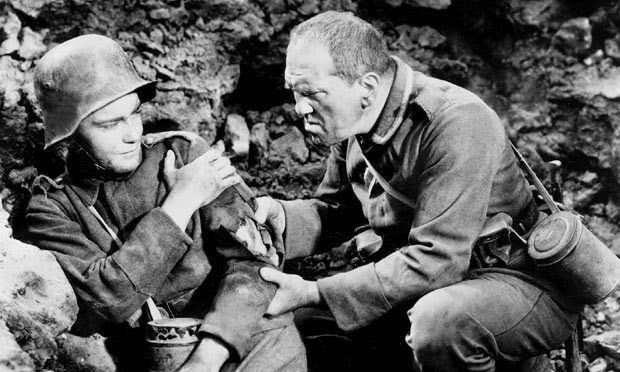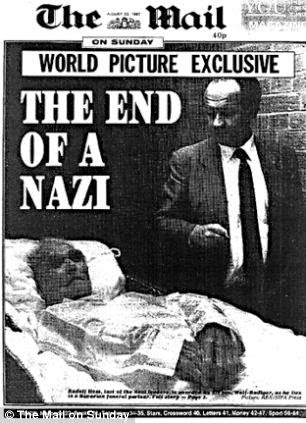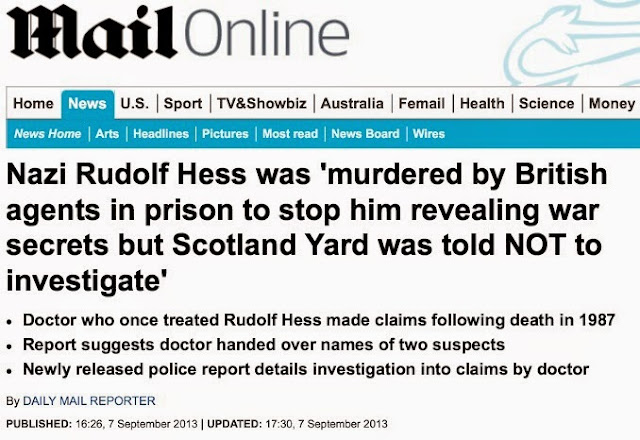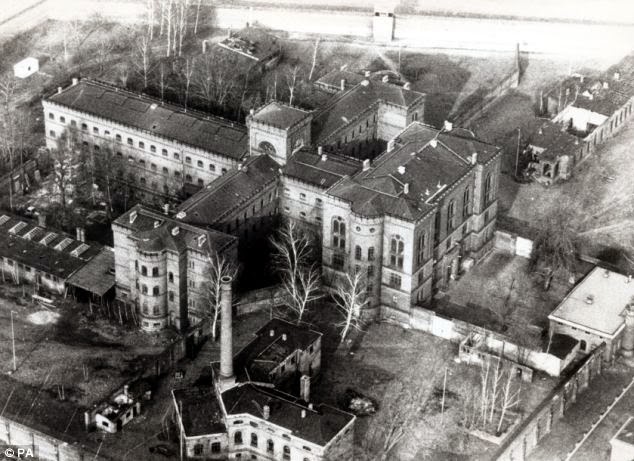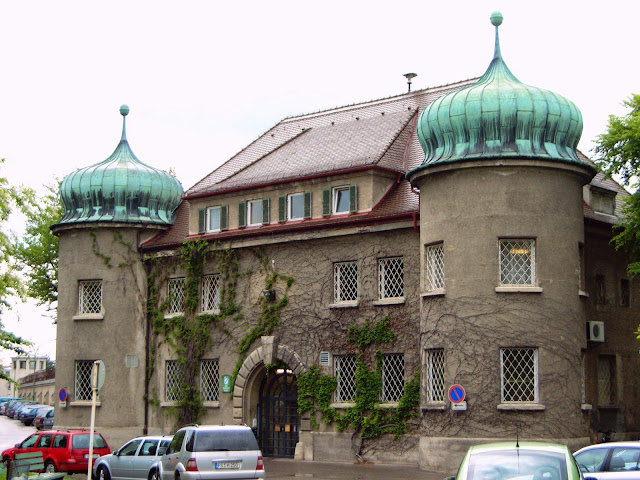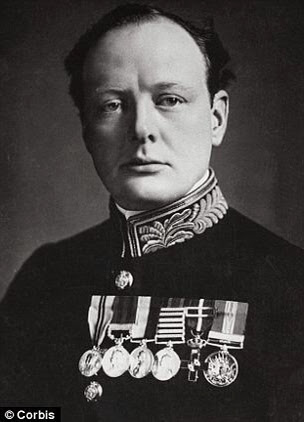Host: Richard D. Heffner
Guest: Lucy Dawidowicz
Title: “The Holocaust and the Historians”
VTR: 6/16/82
I’m Richard Heffner, your host on THE OPEN MIND. When I first went to Rutgers University nearly 35 years ago, it was as a young American historian. And in preparing for today’s program, I came across some notes for a talk I gave then, as only a very young academic could or would, on the nature of history, on the confusion between history as the past, and history as only an accumulation of the necessarily varied, very human, and this, quite filtered records of the past.
My innocence, of course, was informed by much that a very distinguished historian had said about “recorded history being only contemporary thought about the past”. So that when I wrote my Documentary History of the United States, I paid my most profound respects to Charles A. Beard’s insight that, “As a record, all history is supremely an act of faith”.
Now that point of view underlay the discussions we’ve had here on THE OPEN MIND with a number of eminent historians, as most recent with James MacGregor Burns. But before that, with Arthur Schlesinger, Frances Fitzgerald, and others, too.
Now it must, in an explanatory mode, loom large in our program today in its analysis of a most extraordinary phenomenon in world history and in the writing of history: the strange, virtual disappearance of the Holocaust in the historical writings of many nations.
Lucy Dawidowicz is a social historian; the author of The War against the Jews, 1933-1945, A Holocaust Reader, and most recently, The Holocaust and the Historians.
And I welcome you in that role here to join me today. And I wonder if I might point out that you begin your book by saying that Rosa Luxemburg, a Jew who lived with a universal perspective, once abraded a friend who lives with a Jewish perspective, “Why do you come with your special Jewish sorrows?” I feel just as sorry for the wretched Indian victims in Puerto Mayo, for the Negroes in Africa”.
“In our time”, you continued, “that kind of universalism has promoted questions about the particularity of the six million German Jews, European Jews, murdered during the Second World War by the Germans and their helpers [NONSENSE]. Why is it sometimes asked “Should the Jews be singled out from the statistics of the millions who were killed during the Second World War?”
[AN EXCELLENT QUESTION]
And I ask you that question: Why? Why have you written about the Jews, the six million Jews who died at the hands of the Germans in the Second World War?
[ANOTHER EXCELLENT QUESTION]
DAWIDOWICZ: To begin with, I suppose, it is the most subjective thing. I’m Jewish, and, in my lifetime, what happened to the European Jews was perhaps the central experience of my life. I was just out of college when the war began. I was in high school when Hitler came to power. I was in Eastern Europe for a year before the war, lived in Vilna, which was once called “The Jerusalem of Lithuania”, studying Jewish history in the Yiddish language. Came back the last week before the war between the time the pact was signed between Rubentrop and Molotov and before the actual invasion of Poland. So it is that dark background of my life that made me turn to the subject altogether.
[THIS IS AN IMPLICIT ACKOWLEDGEMENT OF THE LACK OF MASS-DEPORTATIONS OR ENFORCED GHETTOS OUTSIDE OF THE GENERAL GOVERMENT OF POLAND AND PRIOR TO SEPTEMBER 1939, AND TO CREATE LINKAGE (WHERE NONE EXISTS) BETWEEN BOTH POLAND AND THE EXTERMINATION OF THE JEWS, AND MAKE THE USSR EQUAL PARTNERS IN THE HOLOCAUST - THESE THINGS ARE OF COURSE NOT TRUE.
IT WAS BRIEFLY FASHIONABLE IN THE 1990s FOR ZIONISTS TO REFER TO AUSCHWITZ, DACHAU, Etc. AS "POLISH DEATH CAMPS", RATHE THAN "NAZI DEATH CAMPS" - THE POLES WERE NOT AMUSED;
THIS IS THE STANDARD COLD WAR 1980s ZIONIST LINE OF ATTACK ON THE SOVIET UNION FOR ABRIGING THE HUMAN RIGHTS OF SOVIET JEWRY - THE EVENTS OF SEPT. 11th 1991 AND SUBSEQUENTLY SHOWED THIS POLITICAL NARRATIVE TO BE FALSE AND IN REALITY NOT TRUE.
IT IS TRUE THAT NOT EUROPEAN JEW WAS INTERNED OR DEPORTED PRIOR TO 1939 UNDER THE GERMAN REICH JUST BECAUSE THEY WERE JEWISH - INSTEAD, THEY WERE MASSIVELY INCENTIVISED TO EMMIGRATE TO PALESTINE UNDER THE TRANSFER AGREEMENT.]
HEFFNER: Yes, but you write in a way that is deeply personal, of course, but with a point of view that indicates that it is to the detriment of all mankind that the Holocaust has been list in history books, as you maintain that it has been.
DAWIDOWICZ: Well, to the extent that the past is distorted and the past is forgotten and unremembered because the historians failed to carry out the obligation, then that is a loss to mankind. And the loss, of course, is a moral loss. Because I think that the Holocaust was a unique event in history. It was not alone the number, the enormous, mind-boggling statistics of six million murdered Jews that is the significant thing. The significant thing is why they were murdered, the intent of the act, and – the point I make in the first chapter of this book – the affect of that murder, which distinguishes then the murder of the six million Jews from the other murders and from the other atrocities and from the other horrible, terrible, cruel, brutal events of that war and of the other wars and of other times.
HEFFNER: Why do you feel, and I don’t mean why do you feel, but why is it, in your opinion, that the Holocaust has been lost in history in this way?
DAWIDOWICZ: Well, there are many reasons. And I try to track my way through the jungle of these many reasons in that book. One reason is that, among historians of different countries, one might say that political or ideological factors take over where it is not politic to speak of Jews and the tragedy and the murder they underwent.
[THIS IS A REFERENCE TO THE COLD WAR SOVIET JEWRY STRAW MAN ARGUEMENT (See above)]
HEFFNER: But that…excuse me…that would be true of the Soviet Union [NONSENSE], it might be true of certain other countries, it wouldn’t be true of the free countries of the Western world.
DAWIDOWICZ: NO, that’s not true of the free countries of the Western world, and there, for the most part, they’re absent minded about the Jews.
HEFFNER: How can you be absent-minded about the Holocaust?
DAWIDOWICZ: Well, there have been a lot of people who were absent minded about the Holocaust or who find it altogether a nuisance; they’re sick and tired of it. I think William Styron as a case in point. Where he’s sick and tired of hearing about the Jews, and so then he went and wrote this enormous novel, Sophie’s Choice, in which he actually takes away the Holocaust from the Jews and gives it to a Polish Catholic woman, that is, transfers the experience, you know, through his characters, of what happened to Jews to a non-Jew. That’s one of the things I talked about in the notion of the universalization of the Holocaust. We come back to Rosa Luxemburg. In a sense, there are some people who think that all the beautiful suffering that the Jews had was too good for them. You know, “Let’s share this wonderful, beautiful suffering”.
[THOUSANDS OF POLISH AND GERMAN CATHOLICS, ESPECIALLY CATHOLIC PRIESTS - MOST NOTABLY ST. MAXIMILLIAN KOLBE DIED IN THE NAZI CAMPS.
THIS IS ABSOLUTE FACT.
NAZI RACE THEORY ALSO PLACE SLAVS - POLES INCLUDED - AS EXPLICITLY INFERIOR TO JEWS, GOOD ONLY FOR HARD LABOUR AND SOUGHT TO EXTERMINATE THE SLAVS BEFORE THE JEWS]
HEFFNER: Come on, no one really thinks in those terms. I think there’s another…
DAWIDOWICZ: Well, you would think so, that if one, you know…I was being kind of mocking about it…but I think there is something to it in that, for believing Christians, Jesus is the epitome of suffering through the ages.
HEFFNER: Hmmm…
DAWIDOWICZ: And for the Jews to come, now and say, “We are the sufferers…this extraordinary mass murder that we, as a people underwent transcends any other suffering”, is bound to set up some kind of subconscious or unconscious resistance. It’s as if, in a sense, the Jews are seeking to deprive Christians of the unique martyrdom and suffering of Christ.
HEFFNER: Well, you say, “To make Auschwitz, for instance, serve as the paradigm for universal evil is, in effect, to deny the historical reality that the German dictatorship had a specific intent in murdering the Jews”. You really want to minimize a Holocaust by making it merely a sign of man’s evil. But don’t you minimize man’s potential for evil by emphasizing what you call “the particularity of the Holocaust”?
DAWIDOWICZ: I don’t intend to at all. But what I think is important to do is to show that the murder of the European Jews did not arise out of some kind of general, unspecified rule to evil, but it arose out of a specific culture of anti-Semitism that was developed and embellished and modernized, one might say, organized and bureaucratized and modernized, to end up in this extraordinary murder of six million people. They were murdered only because they were Jews, because in the minds of the Nazi leaders, the Jews were the enemy. The Nazi regime, The Third Reich, was not out indiscriminately to murder anyone. They murdered their enemies. And the Jews were always the prime enemy.
HEFFNER: But certainly you’re not maintaining…or are you?…that in the proud and not-so-proud history of mankind, there is something so particular, so peculiar, so individual about the murder of six million Jews that one can’t fold it into the evil that we find in the hearts of man. Or would you deny that there is a universality to this kind of evil?
DAWIDOWICZ: Of course there’s a universality to man’s evil. But what I’m saying is that there is a particularity here. Men are frequently evil for ulterior motives. They are not evil simply as sadists. [NONSENSE] They do evil acts because they think things will bring them closer to certain goals to certain interests; give them their heart’s desire [IN THIS CASE, A GERMANY, THEN A EUROPE FREE OF JEWRY]. When people have been …let me give you an example: It’s perhaps a flawed example, but still…in the Soviet Union in the 1920s and in the early 1930s, Stalin and the program for collectivization of the farms, murdered millions, millions of Russian farmers.
I don’t know if anyone knows how many. It was cruel. It was brutal. It was ugly. It was mass murder on a mass scale. But there was, if you will, a rational reason behind it. Now, I’m not justifying this murder, but I’m saying that they didn’t murder the farmers because they decided to murder the farmers, that farmers, as a whole, are bad people, therefore we will murder them. [NO, THEY DECIDED THAT KULAKS WERE BAD PEOPLE AND ENE,OES OF THE REVOLUTION, AND OF THR PEOPLE] They murdered the farmer because they resisted the collectivization of the farms. Those who didn’t resist were not murdered. [NOT TRUE - STALIN DECREED THAT THE KULAKS WERE A CLASS OF PEOPLE AND ENEMIES OF THE STATE]
That is…what I’m saying is…there was a reason for the evil.
[THIS IS A FALSE DISTINCTION - THE REASON IN THE SOVIET CASE WAS TO CREATE UNIVERSAL COLLECTIVISATION, WITHOUT PRIVATE FARMS; THE REASON IN THE GERMAN CASE WAS TO CREATE A EUROPE WITHOUTNA JEWISH MINORITY]
As far as the murder of the Jews by the Third Reich was…the murder was an end to itself.
[THIS IS NOT TRUE - THE END WAS A EUROPE WITHOUT JEWS. DEPORTATION AND COERCIVE EMMIGRATION WERE THE PREFERRED MEANS, DEATH BY FORCED LABOUR, DISEASE AND MASS-MURDER WAS THE "FINAL SOLUTION TO THE JEWISH QUESTION" WHEN THE BORDERS CLOSED AND FURTHER JEWISH EMMIGRATION WAS NO LONGER POSSIBLE OR REALISTIC.]
There was no other purpose to murdering the Jews except to murder the Jews.
[AGAIN, THIS SIMPLY ISN'T TRUE AND REPRESENTS A WHOLLY FALSE AND OBTUSE READING OF NAZI IDEOLOGY AND THE GERMAN HISTORY OF THE 1930s.]
HEFFNER: Would you make a connection between that purposefulness and the place that the Holocaust does not have in the written history, the written record, of Germany in the 30s and the 40s?
[THERE WERE NO DEATH CAMPS OR MASS DEPORTATIONS IN THE 1930s]
Are the kinds of attitudes that were reflected, in your estimation, in the purposefulness of the extermination of the Final Solution, in terms of the Jews…is that reflected in the history texts?
DAWIDOWICZ: Not sufficiently. I think there are a few exceptions. And as I said in the book, I think the most, the finest history of the Third Reich was written by a German historian, someone who was a youngster when Hitler came to power. But I’ll come back to him, perhaps, in a moment.
But for the most part, American historians and English historians and historians of the Western world were not speaking of Soviet historians or the Polish historians. For the most part, I think they are reluctant to grant this particularity of anti-Semitism because they’re reluctant to elevate the place of anti-Semitism in human thinking and in political thinking, and therefore magnify the role of the Jews.
HEFFNER: How would you relate this…if, indeed, you would…I’m thinking now of a documentary film that CBS did some years ago called “Black History: Lost, Stolen, or Strayed” in which that point was made about a non-treatment of Blacks in our own historiography. Would you relate the two phenomena?
DAWIDOWICZ: Well, I think it’s a symbol of phenomenon. That is, history has always been written by the people who represent, so to speak, the leading strata in society. And certainly in the United States it’s been a purview of that Anglo-American…traditional…you know…the WASP. It’s only recently, as a matter of fact, that Jews have entered the field of history in terms of, you know, being academics in the universities. For each new group that emerges in society as a political force, that group then also wants to emerge in the history books.
We’ve seen it with Blacks. We’ve seen it with other ethnic groups. We see it with women now. The role of women in history is now, for the first time, being given serious treatment. Perhaps it’s a little trendy. Still, at times, has still now achieved that kind of historical objectivity one would desire. But, nevertheless, it represents the rise of, if you will, you know, an oppressed group in society, wanting its rightful place, not only in society, but in the history books.
HEFFNER: Which bears out the notion that he who controls the present controls the past.
DAWIDOWICZ: Yes. Absolutely.
HEFFNER: And in turn, he who controls the past, perhaps controls the future?
DAWIDOWICZ: To a certain extent.
HEFFNER: By interpreting our experience?
DAWIDOWICZ: Yeah. I would still venture to say that the people who control power, political power, have a greater role in controlling the future. But I do think there is a great peril in writing history. And I think, for me, writing this book, The Holocaust and the Historians was in part, a traumatic thing, because as I uncovered each chapter, that is, the way history was written in any particular country, and found how inadequate it was, how grossly distorted it was; in some places how untruthful it was, one began to despair of history.
And yet history is my great passion, my love, in a sense, my life. And one can’t undermine, you know, the very foundations of this profession. And then you make a plea, then, of the need and the importance for objective history, for trying to transcend one’s prejudices and one’s youthful predilections and so forth.
HEFFNER: You don’t then, want to embrace Beard’s notion of history as an act of faith? You want the historian to remove himself, to some extent, anyway, for his faith and to be more objective?
DAWIDOWICZ: I don’t think that any historian can really remove himself from himself. That’s a difficult thing. But I think he must try, to the greatest extent that is possible for him, to be able to master himself, to be able to recognize what are his weaknesses and what are his prejudices, and to see if he can discipline himself with regard to them in dealing with the materials.
HEFFNER: But you think that, in terms of the Holocaust, in terms of the treatment of Blacks, in terms of the treatment of women, whose mainstream historians who, indeed, have largely been, as you suggested before, WASPs, have not removed themselves from their backgrounds, have not been able to throw off those chains of their convictions, those acts of faith, so that in our history books, Blacks have not existed to a very great extent in our history books…you are saying now, the Holocaust has not existed to a sufficient extent?
DAWIDOWICZ: Yes. But I would think, in the United States, for example, where the conscience of, one might say, White, liberal America, is burdened by guilt for slavery and Black oppression…Blacks are getting a better deal in history in the United States than the Holocaust is.
[ASTONISHING...]
[ESPECIALLY IN LIGHT OF THE FACT THAT SLAVERY HAPPENED IN THE UNITED STATES AND THE HOLOCAUST DIDN'T...]
The Holocaust seems to me, as much as I see in history books, to be relegated to a kind of kosher kitchen. That is, as you read the history of World War II, you hardly find a mention of this, in general books. You know, there might be a couple of sentences.
But that is, what happened to the Jews of Europe…and this was an integral part of World War II… [???] is somehow shunted aside as not being part of the main action. And where there is some, you know, recognition of its role, it’s a kind of grudging, segregated thing, not integrated into the mainstream of history. And the difference…let me just say this, then; you go back to…there is this one major work by the German historian, Carl Dietrich Bracher. The book is called The German Dictatorship. It wasn’t called “The Nazi Dictatorship”; it’s called The German Dictatorship. And in that book, the history of anti-Semitism in German and the development of the, let’s say, anti-Semitic program that led to the murder of the Jews, has a central place in the unfolding of the whole historical account.
HEFFNER: You said your feeling that Germanism plays a central place in the coming of the Holocaust, rather than, as you suggested a moment ago, Nazism…
DAWIDOWICZ: Well, Nazism is a recent phenomenon.
HEFFNER: Yeah.
DAWIDOWICZ: …and the Nazi party had to build upon the history of anti-Semitism in Germany; the history of anti-Semitism, if you will, in Austria, the history of anti-Semitism in all of Europe. But that is, without the specificity of anti-Semitism in Germany. And one might say, of the characteristics of the Germans, that that existed in their history for generations and perhaps for centuries; authoritarianism, militarism, anti-liberalism fed this anti-Semitism and fed the Nazi idea.
HEFFNER: If we are not sufficiently familiar with the horrors of the Holocaust and the purpose of the Holocaust…what you call its “particularity”… [WHAT IS THIS PARTICULARITY, AND WHAT IS YOUR EVIDENCE FOR IT...?] how can we help but be potential victims for repetition at another time, of the same inputs, of the same ideas, of the same feelings, of the same purpose that went into the creation of that almost unbelievable episode in our history?
DAWIDOWICZ: Well, you know, often we say that, you know, history is a teacher of life. And that presumably we study history so that it would make us understand our past so that we can be guided in the present for our future. The question still is, at bottom, how do we interpret those events of the past and how do we look at them? Now, I would say that, certainly in the Jewish community, among Jews, sometimes wrong conclusions are being drawn from the history of the Holocaust.
HEFFNER: What do you mean?
DAWIDOWICZ: Well, I think you know, sometimes there are groups within the Jewish community that seem to live at the edge of paranoia because of their past. And so that sometimes we may have a warped view of what happens today in terms of our security, for example, in the United States.
HEFFNER: Well, do you want to extend that a little bit, and indicate further what you mean? Or do you mean that happens today in the United States.
DAWIDOWICZ: I believe that the United States has been the most extraordinary country as far as the Jews are concerned, the place of Jews in the society. There’s been no country in the whole world that has accorded to the Jews equality and rights as this country has.
[THIS IS ABSOLUTELY NOT TRUE - Examples include the Spanish Caliphate in Granada, Jerusalem under Saladin, the English Commonwealth under Cromwell, the Dutch Republic, The Vienesse Happsburgs, Mandatory Palestine, etc. etc.]
The history of the Jewish community in the United States is entirely different from the history of any Jewish community in the world anywhere.
[THIS IS NOT TRUE]
To be sure, yes, there is anti-Semitism, there has been anti-Semitism, and no doubt there will be anti-Semitism. But the very nature and character of the anti-Semitism that exists in the United States bears almost no resemblance to that European anti-Semitism, whether it came out of Czarist Russian or Nazi Germany or the Soviet Union today.
HEFFNER: So that you don’t seem to feel that the absence of sufficient references to the Holocaust in American historiography is a function of anti-Semitism?
[WHAT???]
You quote Langner as talking about majority history. And you seem to be saying it’s a function of majority history that history is written from the point of view of what the majority climate of opinion is, and that, also, in this country we haven’t been particularly ideological in our historiography.
DAWIDOWICZ: That’s right. That’s right.
[MEANING : "NOT ZIONIST" - ALSO, NOT TRUE.]
HEFFNER: So you don’t see this here, in this country, as a function of anti-Semitism.
DAWIDOWICZ: No, no. I think here it’s really absent-mindedness.
[I DON'T KNOW WHAT THAT MEANS...]
HEFFNER: It’s not just here?
DAWIDOWICZ: That’s right.
HEFFNER: It’s absent from the picture of the world?
DAWIDOWICZ: That’s right. Yes.
HEFFNER: Blacks feel that that absence, in regard to themselves, is something that has to be characterized much more strongly and much more negatively. Don’t you feel the same thing about that?
DAWIDOWICZ: Well, yes. I think certainly the role of Blacks in the history of the United States is, again, something very specific and particular.
[THATS THE POINT.]
That reminds me, I think, it is Aristotle [OH DEAR], making the distinction between history and poetry, said, you, that history is the specific and poetry is the universal. History is what…(inaudible)…suffered, did, and suffered. So that history is always specific. And the history of the Blacks in the United States is different from the Jews in the United States. The Blacks are to the United States what the Jews were to Europe.
[WELL, NOT REALLY....]
HEFFNER: It’s so interesting that there are so few people who are aware that historians for the past, as newspapermen and electronic reporters for the present, create our public opinion, make us think what we think about the world around us. You must have felt that many times as you studied this lapse, this absence, of the Holocaust. Is there any sense, in your own work, that people are becoming more aware of the importance of those who comment, recreate, who call themselves reporters or call themselves historians? Or are we condemned to repeating that pattern?
DAWIDOWICZ: I think we’re not going to improve in that regard. There again, if I can quote, what was it, “History repeats itself”. And then, was it Marx who said, “The first time is tragedy, the second time is farce”? We’re talking about serious history, and then you talk about the reporters on, you know, the media and the newspapers and so on. They are not historians. They don’t know how to weigh evidence. They report news as given to them, and very often report it uncritically, without sifting it. They’re not in a courtroom where you weigh and balance the evidence. And the historian, of course, is, in a sense, by himself, the courtroom of the past.
HEFFNER: Mrs. Dawidowicz, we’ve just finished a half hour…and we literally have finished it…in which you have pointed out that the historians, quite frequently, haven’t done much better in weighing and judging than the reporters.
DAWIDOWICZ: But they should.
HEFFNER: But they should. And so should the reporters. Thank you very much for joining me today.
DAWIDOWICZ: Thank you.


